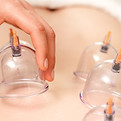
kim
"the mind is a mirage. the truth lies in the breath. come back to the breath, come back to the body."

kim's offerings
Integrative Bodywork
Intuitive Movement Therapy
Cupping Therapy
IASTM
dive deeper
Below are brief descriptions of the offerings that Kim provides.

Integrative Bodywork
Yes, this is massage. But it is much more than that which is why integrative bodywork feels like a more encompassing term.
The difference between a typical massage session and an integrative bodywork session is complexity and communication.
There are a variety of techniques that may or may not be incorporated in your session. It is dependent on what you and your body need in each moment. After discussing your goals, your time is designed to provide you with exactly that. It may be pain management, relaxation, increased mobility or all of the above. This could include deep tissue techniques, assisted stretching, cupping, IASTM and/or essential oils.

Movement Therapy
Movement is critical in the health and well-being of your body, mind and spirit. You could describe these offerings as yoga-based but yoga in and of itself is an incomplete practice. While stretching is highly beneficial, strength and stability is just as much a piece of the whole puzzle.
You may be offered a few exercises after a session to support your at-home healing or you can book a full movement session which consists of an in depth analysis of what the body needs, including hands on adjustments, to integrate the movement patterns in a more complete and embodied way.

Cupping and IASTM
There are many types of cupping and IASTM (instrument-assisted soft tissue mobilization) treatment.
The "pain-gate" theory says that the touch and pressure from cupping stimulate large nerve fibers, which results in the blocking of pain signals to the brain sent by other nerves. The gate control system is in our spinal cords. So, activating these nerve fibers can block pain transmission.
Sometimes cupping and IASTM is used as a technique of tissue distraction release. The cups are glided across different areas to lift and separate tissue. The tools of IASTM are "scrapped" along the tissue fibers. Both techniques enhance the release of the interfaces between the neural tissues, fascia, skin, ligaments, muscles and tendons. Both techniques have been shown to relax muscles, release trigger points, improve lymphatic flow, increase local circulation and release scar tissue adhesion.

